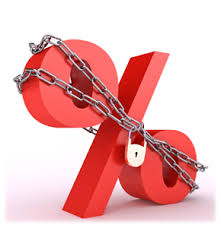Getting a Home Loan: What You Need to Know About Your Interest Rate

Interest rates are often a big part of the conversation when you are getting a home loan. Most people want to secure the lowest rate possible while still maintaining low fees and quality of service. There are many factors that go into what your interest rate will be: market fluctuations, your credit score, down payment amount or equity position, the length of your loan, and whether it is a fixed or adjustable rate. All of these should be discussed with your mortgage professional at or prior to your application. One big question that will come up is whether you would like to float or lock your interest rate. Let’s discuss some of the pros and cons of both.
Float vs Lock
Let’s start by defining the terminology. If you lock your interest rate you are securing it at X% that will be good through closing. By doing this you know what your rate is going to be at or around the time of application. If you choose to float your interest rate, your interest rate will not be secured until sometime later in the future before closing. It may seem counter-intuitive to float your rate, but there are good reasons to in some cases. Just ahead we’ll discuss the pros and cons.
Floating Your Rate
Floating your rate carries with it some risk. Interest rates can change daily and in some cases more than once in a single day. These changes can be difficult if not impossible to predict. Major political changes or global insecurity can cause rates to lower, and strong moves in the stock market can cause them to rise. Part of choosing to float or lock definitely depends on your risk to comfort level. Here are a few reasons to float your rate:
- You expect your credit score to rise before closing. Credit scores are one of the biggest determining factors in your interest rate. If you have worked with your lender to raise your score, it could be wise to wait to lock your rate until you see those credit changes.
- Your closing is 45 days or more away. The shorter the length of your lock the better your interest rate. When you have a lock that is longer than 45 days it tends to carry with it a hefty penalty. Discuss this with your loan officer.
- Rates are expected to drop. As I mentioned it is difficult to tell what is going to happen to rates, but if there is news expected that will cause a flight to the bond market it could be a good idea to float.
- If you are refinancing and the appraisal is tight and will determine what your equity position is or the type of loan you end up with, it could be beneficial to float until the appraisal comes back.
These are just some of the reasons, you will want to discuss your situation in detail with your lender before making a decision.
When to Lock?
It is near impossible to get the timing exactly right on locking your rate, and oftentimes depends on how lucky you are. The benefits of locking your rate should be fairly apparent. You will know exactly what rate you will be getting and there is no chance of it changing. The major downside is that you will not be able to take advantage of lower rates should they drop prior to closing. In most cases I recommend locking to my clients as soon as we have a contract in, but each situation is unique. If you are thinking of purchasing a home or looking to refinance, give me a call and we can go over your scenario. Call or text me at (314) 472-DOUG (3684).
Podcast: Play in new window | Download
